If you’re good at creating things and want to sell them online, Etsy is a fantastic website to use. It’s mainly used by people who make or sell special handmade items. Lots of customers who want unique crafts and products go to Etsy to buy them. In 2022, more than five million sellers were already using the Etsy official site. So, if you join, you’ll be part of a large community.
But before you start selling on Etsy, it’s essential to understand the laws and rules related to selling online through the platform.
Rules Of Selling In Etsy

It can be confusing to navigate the rules around selling on Etsy. According to their guidelines, you don’t need a special business license to start. However, it’s important to consider other factors that may come into play. Depending on what and where you sell, you may need licenses or permits from local, county, state, or federal agencies. It’s understandable to feel overwhelmed, but determining whether your Etsy shop is a business or a hobby is the first step. If it’s a business, you’ll need a license, but if it’s just a hobby, you won’t need one. We’re here to help you understand the process and support you every step of the way.
Is Your Etsy Selling a Business or a Hobby?

Are you wondering if your side hustle is just a hobby or a legitimate business? The IRS has nine factors they consider when making this determination, and we’re here to break them down for you.
First, they look at your profit motive. Are you running this activity with the intention of making a profit? If so, great! That’s a good sign. They also consider the amount of time and effort you put into the activity, as well as whether you rely on the income generated from it to support yourself or your family.
Your level of expertise in the area of the activity and past success also play a role in the IRS’s decision. Additionally, they consider how much money you’ve invested in the activity, whether you have a well-thought-out business plan, and if you keep proper records and documentation.
Lastly, they take into account whether you make changes to improve profitability or grow the business. If you’ve made a profit in at least three of the last five years when you paid taxes, the IRS sees it as a business. And if you plan to make a profit from what you do, it’s also considered a business.
Having a legitimate business can be a great advantage, as you’re able to deduct business expenses from the money you make on platforms like Etsy. While getting a business license may seem daunting, it’s a necessary step in taking your business to the next level.
So, if you’re putting in the time and effort and have a profit motive, don’t be afraid to embrace the title of “business owner.” With the right planning and mindset, you can turn your passion into a successful venture.
Is selling on Etsy a hobby of yours?

Hey there! Are you using Etsy as a fun hobby? That’s great! Just keep in mind that you can only deduct expenses up to the amount you earned from selling your products. For instance, if you spent $200 on creating an item that you sold for $150, you can’t claim the $50 loss. But don’t worry, you don’t need a business license if it’s just a hobby. However, it’s essential to remember that even though it’s a hobby, you’ll still have to pay taxes on any income you make from your Etsy shop. Stay optimistic, and keep creating – just make sure to report your earnings!
Getting a Business License To Sell On Etsy

A sole proprietorship involves less paperwork. However, if you want more protection and advantages for your Etsy shop, consider forming a corporation or LLC. With a corporation or LLC, your business finances are separate from your personal finances, ensuring that your personal assets are not affected by legal issues or debts. Corporations and LLCs offer tax advantages and make it easier to obtain business loans or credit. They also give your business a more professional image, allowing you to attract investors and hire employees.
To legally sell things from home or online, you must obtain a business license. However, the requirements vary depending on your location and business type. To acquire a license, you must fill out an application and pay the necessary fees. Additionally, you must renew your license each year by paying another fee. Before applying, you must select a name for your business and decide on a business structure.
To obtain a business license, follow these five simple steps:
1. Determine the type of license you need based on your location and business type.
2. Contact your local government office or visit their website to obtain the appropriate application form.
3. Fill out the application with all required information and pay the necessary fees.
4. Submit the application to the relevant government office.
5. Once approved, you will receive your business license and can legally operate your business.
Your business name is crucial as it represents your brand. Choose a name that is easy to remember, say, and write. If you sell online, ensure that your name stands out from other sellers.
When applying for a business license, you must specify your business type. You can choose from several options, including sole proprietorship, corporation, limited liability company (LLC), or other entities. If you run an Etsy shop alone without any partners, you are a sole proprietor. This means that you report all your earnings (or losses up to the amount you earned) from Etsy on your personal tax return.
Consult a local business attorney to determine the best structure for your specific Etsy business.
Other Licenses And Permits You Might Need To Sell On Etsy

Besides a business permit, there are other licenses and permits required to run your business.
Employment Identification Number (EIN)
If your business is a company, you can get an EIN from the IRS. It’s a nine-digit number that separates your business from yourself. You’ll need it to open a business bank account, get credit lines, or file taxes for your business. If you’re a sole proprietor, you can use your social security number, but you might consider getting an EIN to protect against identity theft.
Seller’s License
A seller’s license, also called a “sales and use” license or “sales tax ID,” is a state permit allowing you to sell to people in that state. After a Supreme Court ruling, even online sellers without a physical presence in a state may need to collect and pay sales tax in states that require it. You may need this license if your online sales exceed a certain dollar amount or a specific number of transactions.
Home Occupancy Permits
If you run your Etsy business from home, there might be special requirements for home-based businesses in your city and state. Check what licensing you need.
HOA Approval
If you live in a neighborhood with a homeowner’s association, they might have rules for home-based businesses. Make sure to review their guidelines.
Some FAQs
If you want to know specific requirements state-wise, be sure to go through these FAQs.
Answer: The requirement for a business license to sell on Etsy in California can vary depending on the city or county where you operate your business.
Answer: Etsy itself doesn’t ask for a business license to sell on their platform. However, depending on where you live, you may still need to obtain local permits or licenses to sell your items legally.
Answer: To start selling on Etsy, sign up and create your shop. List your items with photos, descriptions, and prices. Set up payment and shipping options. When you get orders, fulfill them. Offer good customer service, and follow local laws and Etsy’s policies!
Conclusion
If your Etsy activity is a business, you need a business license. If it’s just a hobby, no license is necessary. Figuring out whether it’s a business or a hobby can be tricky, so it’s a good idea to consult a small business attorney for guidance.
When you’re ready to get a license, follow a simple DIY business formation process to meet all the legal requirements in your state.
Read More:
















